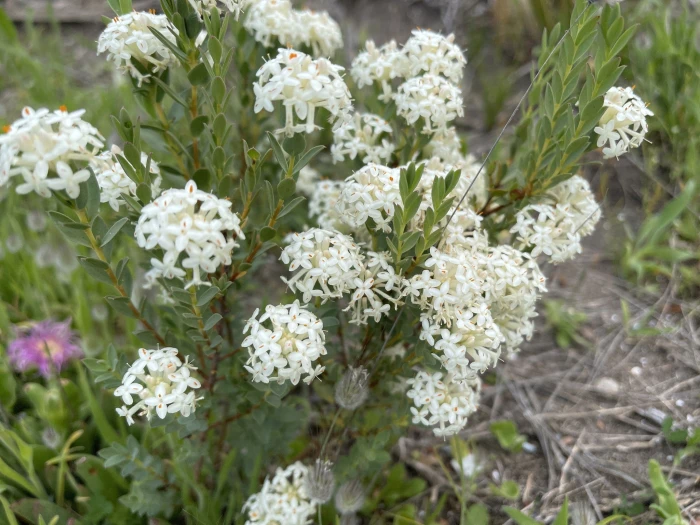Smooth Riceflower
(Pimelea glauca)
Smooth Riceflower (Pimelea glauca)
/
/

© Dylan Wishart
CC BY 4.0
Image By:
© Dylan Wishart
Recorded By:
Copyright:
CC BY 4.0
Copyright Notice:
Photo by: © Dylan Wishart | License Type: CC BY 4.0 | License URL: http://creativecommons.org/licenses/by/4.0/ | Uploader: plantrant | Publisher: iNaturalist |

























Estimated Native Range
Climate Requirements
| • Precipitation | 21" - 25" |
| • High Temp. | 74°F - 86°F |
| • Low Temp. | 32°F - 46°F |
Summary
Pimelea glauca, commonly known as Smooth Riceflower, is a much-branched shrub endemic to a variety of habitats in southeastern Australia, including open eucalypt forests, coastal heathlands, grasslands, and sand dunes. It typically grows up to 3 feet tall and has a similar spread, with narrowly elliptic to lance-shaped leaves that are smooth to the touch. The creamy-white flowers are small but numerous, arranged in dense heads of seven or more, and bloom mainly from August to December. The flowers are not particularly showy but do add a subtle charm to the plant’s overall appearance.
Smooth Riceflower is appreciated for its hardiness and adaptability to various soil types, although it prefers sandy soils. It is often used in native plant gardens and as part of revegetation projects due to its resilience and low maintenance requirements. In cultivation, it requires well-drained soil and can tolerate both full sun and part shade. While it is drought-tolerant once established, regular watering during prolonged dry periods can promote better growth. One notable drawback is its toxicity; all parts of the plant are poisonous if ingested, making it unsuitable for areas with grazing livestock.CC BY-SA 4.0
Smooth Riceflower is appreciated for its hardiness and adaptability to various soil types, although it prefers sandy soils. It is often used in native plant gardens and as part of revegetation projects due to its resilience and low maintenance requirements. In cultivation, it requires well-drained soil and can tolerate both full sun and part shade. While it is drought-tolerant once established, regular watering during prolonged dry periods can promote better growth. One notable drawback is its toxicity; all parts of the plant are poisonous if ingested, making it unsuitable for areas with grazing livestock.CC BY-SA 4.0
Plant Description
- Plant Type: Shrub
- Height: 0.5-3 feet
- Width: 1.5-3 feet
- Growth Rate: Moderate
- Flower Color: White
- Flowering Season: Spring, Summer
- Leaf Retention: Evergreen
Growth Requirements
- Sun: Full Sun, Part Shade
- Water: Low
- Drainage: Medium, Fast
Common Uses
Border Plant, Low Maintenance, Rock Garden, Showy Flowers
Natural Habitat
endemic to a variety of habitats in southeastern Australia, including open eucalypt forests, coastal heathlands, grasslands, and sand dunes
Other Names
Common Names: Sand Rice-flower
Scientific Names: Pimelea glauca, Banksia glauca, Calyptrostegia glauca, Calyptrostegia intermedia, Calyptrostegia schlechtendaliana, Pimelea campicola, Pimelea campicola, Pimelea glauca var. major, Pimelea glauca var. minor
GBIF Accepted Name: Pimelea glauca